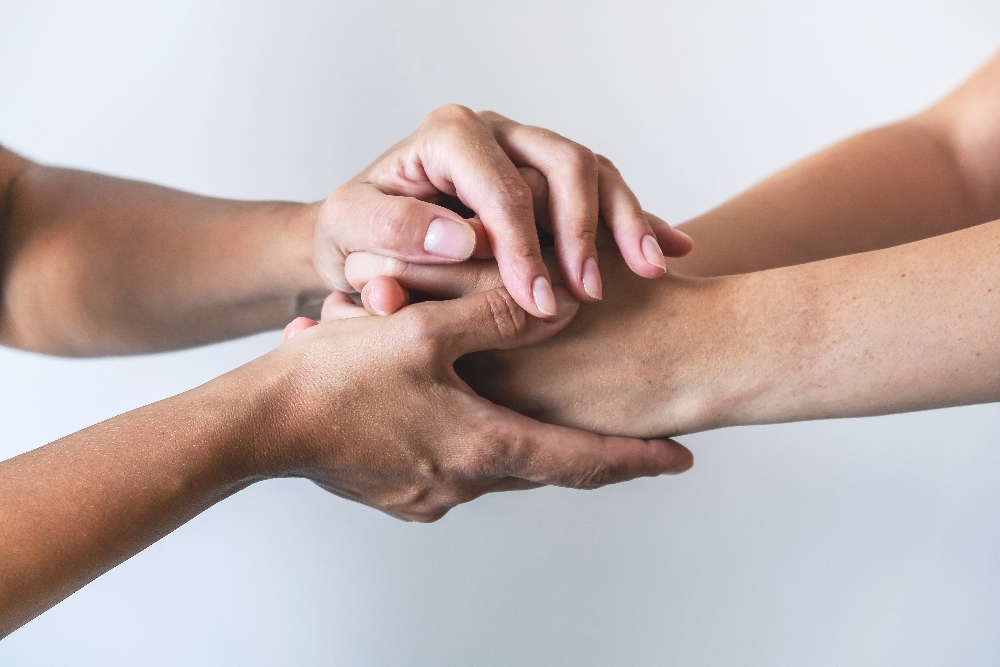Understanding the Recovery Journey

Recovery from addiction is not a linear process. Your loved one may face setbacks, but this doesn’t mean failure.
Understanding what they’re going through is the first step in learning how to support a loved one with addiction. Recovery involves:
- Physical healing from substance dependence
- Emotional and psychological adjustment
- Rebuilding relationships and trust
- Developing new coping mechanisms
- Creating a sustainable sober lifestyle
The Impact of Family Support
Families are powerful resources for enhancing treatment and recovery success among youth with SUDs, and this extends to adults as well. Support systems provide a sense of belonging to combat the isolation drug use tends to worsen.
How To Support A Loved One With Addiction: Practical Steps
Educate Yourself About Addiction
Understanding addiction as a disease is crucial. After decades of research, addiction is now understood to be a chronic, treatable brain disorder. This knowledge helps you approach your loved one with compassion rather than judgment.
Learn about:
- The specific substance they’re recovering from
- Common withdrawal symptoms and timeline
- Treatment options available
- Signs of relapse
If your loved one is dealing with specific substances, understanding their unique challenges is important. For instance, benzo withdrawal can be particularly complex and dangerous without proper medical supervision.
Encourage Professional Treatment
Research consistently shows that shorter stints (e.g., under 90 days) in rehab correlate with higher relapse, emphasizing the importance of comprehensive treatment. Professional help through medical detox and ongoing therapy is often essential.
Support your loved one in finding appropriate treatment, which may include:
- Detoxification programs
- Residential treatment
- Outpatient therapy
- Dual diagnosis care for co-occurring mental health issues
Practice Active Listening
When learning how to support a loved one with addiction, communication is key. Practice active listening by:
- Giving them your full attention
- Avoiding interruptions or judgmental comments
- Asking open-ended questions
- Reflecting back what you hear to show understanding
- Validating their feelings without enabling their behavior
Set Healthy Boundaries
Supporting someone doesn’t mean enabling their addiction. Establish clear boundaries about:
- Financial support
- Living arrangements
- Consequences for drug or alcohol use
- What behaviors you will and won’t tolerate
Remember, boundaries protect both you and your loved one.
Learn About Therapy Approaches
Different therapeutic approaches work for different people. Understanding these can help you support your loved one’s treatment choices:
Motivational interviewing helps build motivation for change
Cognitive Behavioral Therapy (CBT) helps identify and change negative thought patterns
Dialectical Behavior Therapy (DBT) teaches emotional regulation skills
Supporting Different Stages of Recovery

Early Recovery (0-90 days)
This period is often the most challenging. Your loved one may experience:
- Physical withdrawal symptoms
- Emotional instability
- Strong cravings
- Sleep and appetite issues
How to help:
- Offer practical support (transportation to appointments, help with daily tasks)
- Be patient with mood swings
- Remove temptations from shared spaces
- Celebrate small victories
For those dealing with alcohol addiction, the early stages can be particularly difficult as alcohol is widely available and socially accepted.
Middle Recovery (3 months to 1 year)
During this phase, your loved one is building new habits and coping skills.
How to help:
- Support healthy new activities and hobbies
- Encourage ongoing therapy and support group participation
- Help them rebuild social connections with sober friends
- Be understanding about the time recovery takes
Long-term Recovery (1+ years)
Recovery is real and that with a range of holistic, individualized supports, people with mental health and/or substance use conditions can and do overcome these challenges. Long-term recovery focuses on maintaining sobriety and building a fulfilling life.
How to help:
Stay involved in family therapy if recommended
Continue celebrating milestones
Support their ongoing growth and goals
Maintain realistic expectations
Dealing with Co-occurring Mental Health Issues
Many people in recovery also struggle with mental health conditions. As per 2023 NSDUH, 48.5 million aged 12 or older experienced substance use disorders (SUDs) in the past year, and many of these individuals have co-occurring disorders.
Common co-occurring conditions include:
Understanding these conditions helps you provide more comprehensive support. Dual diagnosis treatment addresses both addiction and mental health simultaneously for better outcomes.
Understanding Different Types of Addiction
Your support approach may vary depending on the substance involved:
Opioid Addiction
Opioid addiction often requires medication-assisted treatment (MAT). Research shows up to 90% of people who receive this type of addiction support are less likely to use drugs after two years than those who don’t have treatment.
Stimulant Addiction
Those recovering from cocaine addiction or meth addiction may face intense cravings and require different support strategies.
Prescription Drug Addiction
Prescription drug addiction often carries additional shame due to the “legal” nature of these substances initially.
What NOT to Do When Supporting Someone in Recovery

Learning how to support a loved one with addiction also means understanding what not to do:
Don’t:
- Enable their addiction by giving money or making excuses
- Try to control their recovery process
- Take their addiction personally
- Ignore your own needs and mental health
- Give ultimatums unless you’re prepared to follow through
- Expect immediate or perfect results
Taking Care of Yourself
The success rate of just about anything is largely dependent on following through with the suggested changes. This applies to family members too. Supporting someone with addiction is emotionally taxing, and you need to maintain your own well-being.
Self-care strategies include:
- Joining support groups for families (like Al-Anon or Nar-Anon)
- Seeking individual therapy for yourself
- Maintaining your own interests and relationships
- Setting realistic expectations
- Practicing stress management techniques
Consider trauma therapy if your loved one’s addiction has caused you significant emotional harm.
Building a Support Network
Recovery is rarely successful in isolation. Help your loved one build a comprehensive support network:
- Professional support: Therapists, doctors, case managers
- Peer support: Group therapy participants, 12-step program members
- Family support: Understanding family members and friends
- Community support: Sober living communities, recovery-focused activities
Understanding Relapse
Relapse is common, affecting 40-60% of people in the first year. Relapse rates for drug and alcohol use resemble those of other chronic diseases, including hypertension and diabetes with an estimated 40-60% of individuals relapsing while in recovery.
If relapse occurs:
- Don’t take it personally or as a complete failure
- Encourage them to return to treatment immediately
- Avoid “I told you so” attitudes
- Focus on getting back on track rather than dwelling on the setback
- Consider whether treatment intensity needs to increase
Creating a Recovery-Friendly Environment
Your home environment can significantly impact recovery success:
- Remove all alcohol and drugs from easily accessible areas
- Create drug-free spaces where your loved one feels safe
- Establish new family routines that don’t revolve around substance use
- Stock healthy foods and encourage regular exercise
- Minimize triggers like certain music, people, or locations
Financial Considerations
Addiction treatment can be expensive, but many insurance plans now cover addiction treatment. Understand what’s covered under:
- Aetna rehab coverage
- Blue Cross Blue Shield drug rehab
- Cigna rehab benefits
- United Healthcare rehab coverage
Long-term Recovery Success Factors
Success in rehabilitation transcends mere statistics. It encompasses the restoration of hope, the rebuilding of lives, and the rediscovery of purpose. Factors that contribute to long-term success include:
- Ongoing treatment: Patients who remained in treatment longer are less likely to overdose after discharge
- Strong support systems: Family involvement and peer support
- Healthy lifestyle changes: Exercise, nutrition, sleep hygiene
- Purpose and meaning: Work, volunteering, hobbies
- Continued learning: Understanding addiction and recovery
When to Seek Additional Help
Know when professional intervention might be necessary:
- If your loved one expresses suicidal thoughts
- If they become violent or threatening
- If they’re engaging in dangerous behaviors
- If your own mental health is severely impacted
- If multiple family members need support
Celebrating Recovery Milestones
Recovery is an ongoing journey worthy of celebration. With the right treatment, support, and resources, recovery is possible. Acknowledge important milestones:
- 30, 60, 90 days sober
- Six months, one year clean
- Completing treatment programs
- Rebuilding relationships
- Achieving personal goals
Looking Forward: Hope and Recovery
The journey of learning how to support a loved one with addiction is challenging but rewarding. Children with an addicted parent are up to four times likelier to develop a similar disorder, though not all will – support, counseling, and stable home environments can mitigate risk. Your support can break generational cycles of addiction.
Family support canbe one of the strongest protective factors in treatment. By educating yourself, setting boundaries, and providing consistent support, you’re giving your loved one the best chance at lasting recovery.
Remember that recovery is possible, and your role as a supportive family member or friend is invaluable. Stay hopeful, take care of yourself, and trust in the recovery process.
If you or someone you love is struggling with a substance use disorder, get in touch with California Addiction Treatment to learn more about the recovery process and our treatment programs.




